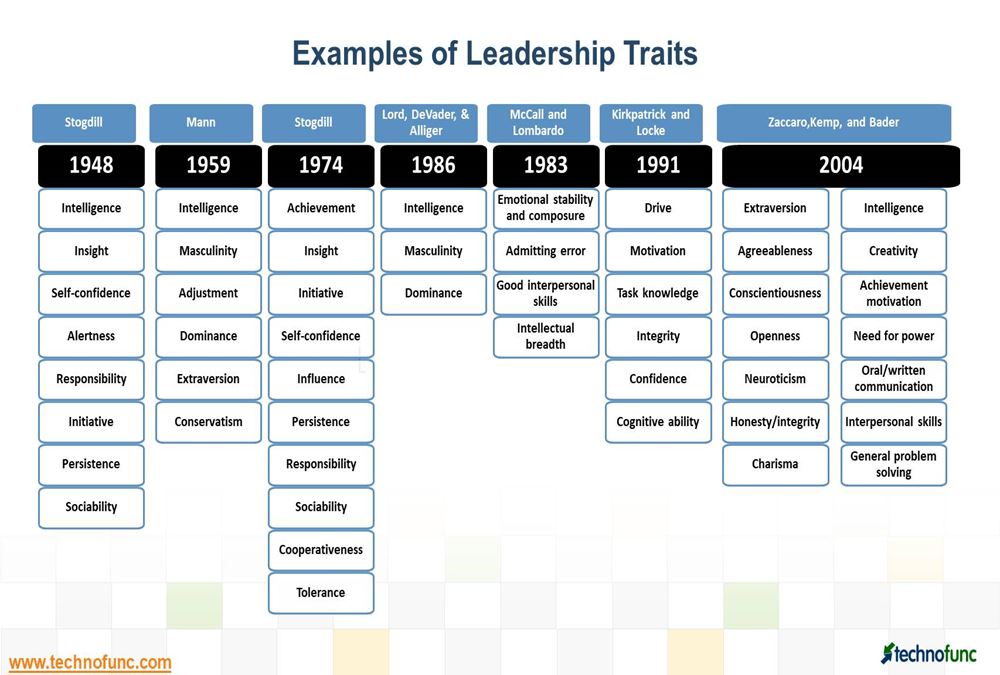- Home
- Business Processes
- Industry Knowledge
- Aerospace Industry
- Automotive Industry
- Banking Domain
- BFSI Industry
- Consumer/ FMCG Industry
- Chemicals Industry
- Engineering & Construction
- Energy Industry
- Education Domain
- Finance Domain
- Hospitality Domain
- Healthcare Industry
- Insurance Domain
- Retail Industry
- Travel and Tourism Domain
- Telecom Industry
- Leadership Skills
- eLearning
- Home
- Leadership Skills
- Leadership Theories
- Leadership Traits – A great List
Leadership Traits – A great List
What are the qualities and characteristics of a good leader? Great leaders possess core leadership traits and skills. The list includes the most important leadership qualities and skills to look for in a great leader. These are must-have traits of a powerful and successful leader, the qualities a leader possess to be great.
A broad classification to six categories of traits is also done below:
Physical Characteristics of the Leader:
- Age
- Height
- Weight
- Alertness
- Energetic
- Masculinity
- High energy level
- Physical stamina
- Tolerance for stress
- Not concerned about being overworked
- Vitality
Background Characteristics of the Leader:
- Education
- Social Status
- Mobility
- Experience
- Experience in a variety of different types of situations
- Broader perspective
- Expertise in dealing with different types of problems
- Competent and skilled
Intelligence Characteristics of the Leader:
- Ability
- Judgment
- Knowledge
- Clever (intelligent)
- Conceptually skilled
- Creative
- Knowledgeable about group task
- Intellectual breadth
- Insight
- Learns from experience
- Adapts to change
- Good judgment
- Foresight
- Intuition
- Creativity
- Self-knowledge
- Coordinator
- Objective
- Decisive
- Asks for more responsibility
- Knows how to delegate
Personality/Emotional Characteristics of the Leader:
- Aggressiveness
- Alertness
- Dominance
- Decisiveness
- Enthusiasm
- Extroversion
- Independence
- Self-confidence
- Authoritarianism
- Assertive
- Tolerant of stress
- Conservatism
- Desire to improve
- Understands own strengths and weaknesses
- Self-objectivity
- Emotional intelligence
- Self-awareness
- Empathy
- Self-regulation
- Ambitious
- Courageous
- Knows self
- Risk taker
- Not intimidated by superiors
- Personal competence
- Optimistic
- Exhibits concern for others
- Encourages and engages opposing viewpoints
- Constant and reliable
- Self-disciplined
- Determination
- Need to achieve
- Caring
- Empathizing
- Constancy
Task-Oriented Characteristics of the Leader:
- Achievement Needs
- Responsibility
- Initiative
- Persistence
- Ambitiousness
- Achievement-orientated
- Decisive
- Persistent
- Willingness to assume responsibility
- Organized (administrative ability)
Social Characteristics of the Leader:
- Sociability
- Supervisory Ability
- Cooperativeness
- Popularity
- Prestige
- Tact
- Diplomacy
- Adaptability
- Adjustment
- Cooperative
- Dependable
- Tactful
- Persuasive
- Socially skilled
- Emotional stability and composure
- Good interpersonal skills
- Well-adjusted
- Oriented toward improving self
- Detached
- Honest
- Ethical
- Trustworthy
- Behavioral flexibility
- Understanding
- Empathy
- Social Insight
- Charm
- Tact
- Diplomacy
- Persuasiveness
- Listener
- Collaborative
- Strong motivator
- Cooperative
- Influencer
Communication:
- Ability to communicate
- Ability to articulate a vision
- Ability to persuade others
- Communicate purpose
- Communicate direction
- Communicates passion to others
- Good communication skills
- Use metaphors
- Experts at one-to-one communication
- Superior speakers
- Excellent writing skills
- Creates and maintains a communications network
- Has people keep them informed on problem situations
- Networks with people inside the organization
- Maintains contacts outside the organization
- Doesn’t depend on only one source for information
- Able to communicate with key individuals
- Eager to explore new approaches to their work
- Are not fuzzy about results, interested in ways to track their progress
- Communicates persuasively

Related Links
You May Also Like
-
Jung first introduced his personality theory and explained that all humans have a natural impulse to relate meaningfully to the world through productive work and people through significant relationships. He used four psychological functions - thinking and feeling (rational functions) and sensation and intuition (irrational functions). He also used introversion and extraversion and its impact on appropriate leader behaviors.
-
Normative leadership theories are built on moral principles and tell leaders how they ought to act. Victor Vroom formulated the normative model of leadership that specifically address leader behavior explicitly built on moral principles or norms. Normative leadership theories tell leaders how they should act to raise the moral performance inside the working group and manage their different responsibilities.
-
The social identity theory of leadership views leadership as a group process. Social identity is a person's sense of who they are based on their group membership. Social identity theory sets agendas and goals generated by social categorization, defines who we are based on processes associated with social identity, and motivates to conduct ourselves based on what followers think of the leader.
-
The Hersey and Blanchard Situational Theory model suggests that a leader must adapt his leadership style based on task and relationship behaviors appropriate to the situation. Leadership style is dependent on the maturity level and abilities of followers. Under this model, successful leadership is both task-relevant and relationship-relevant.
-
In this study of power, Raven identified five bases of power as coercive, reward, legitimate, referent, and expert. The 5 Types of Power can help you decide when it is appropriate to use a particular type of power in important situations. Leadership involves authority and it is very important for leaders to understand what type of power they're using.
-
Behavioral Theories of Leadership
Behavioral Theory of leadership is a big leap from Trait Theory, as it was developed scientifically by conducting behaviour focused studies. The theory emphasizes that leadership capability can be learned, rather than being inherent. This theory is based on the principle that a leader's behaviors can be conditioned in a manner that one can have a specific response to specific stimuli.
-
McClelland's Theory of Needs is a human motivation theory which states that an individual's specific needs are acquired over time through our culture and life experiences. As per the three needs theory, these acquired needs significantly influence the behavior of an individual. The three main driving motivators are the needs for achievement, affiliation, and power.
-
Attribution Theory of Leadership
The attribution theory of leadership deals with the formation of individual opinions about the reasons for particular events or observations. People will always try to understand why people do what they do. The leader will make a judgment about his employees based on his attribution of the causes of the employees' performance. Individuals will also make inferences about the leader and react to poor performance by the leader.
-
Lewin’s Change Management Model
Lewin's change management model is a framework for managing organizational change. Lewin's methodology of different Leadership Styles recognizes three distinct stages of change - creating the perception; moving toward the new desired level of behavior and, ensuring new behavior as the norm.
-
University of Iowa Studies was the first leadership study to analyze leadership using scientific methodology. The study was conducted by Lewin, Lippitt, and White and worked on different styles of leadership. The studies explored three leadership styles - authoritarian, democratic, and laissez-fair leaders. This early study was very influential and established three major leadership styles.
Explore Our Free Training Articles or
Sign Up to Start With Our eLearning Courses

About Us
Learning
© 2023 TechnoFunc, All Rights Reserved










